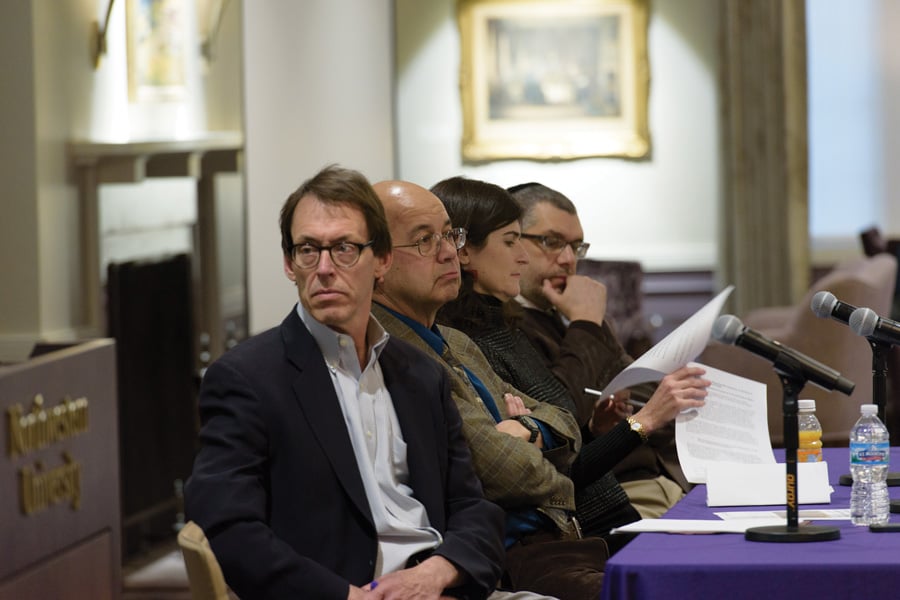Buffett Institute holds panel on Trump’s foreign policy
Katie Pach/Daily Senior Staffer
Left to right: Peter Slevin, Hendrik Spruyt, Juliet Sorenson, Yohanan Petrovsky-Shern. The Buffett Institute for Global Studies held a panel to discuss the future of Trump’s foreign policy.
April 28, 2017
The Buffett Institute for Global Studies held a panel of Northwestern faculty Thursday to discuss the state of President Donald Trump’s foreign policy as his first 100 days draw to a close.
The event, held in Scott Hall, aimed to “discuss some of the pressing global issues facing President Trump,” according to its description. Communication Prof. D. Soyini Madison, history Prof. Yohanan Petrovsky-Shtern, Medill Prof. Peter Slevin, political science Prof. Hendrik Spruyt and Pritzker School of Law Prof. Juliet Sorensen spoke on the panel in front of about 30 people. Panelists discussed topics regarding national security, the role of the media, the future of trade deals and the constitutionality of Trump’s campaign promises.
The Buffett Institute hosted a similar panel discussion in January to discuss the international politics of the Trump presidency. Buffett Institute director Bruce Carruthers told The Daily he had hoped Thursday’s panelists would be able to further expand on the topics regarding Trump’s presidency that had not received enough coverage during the previous event.
He said he wanted to give the university community an opportunity to hear expert opinions and have conversations of their own.
“There was a sense of unfinished business … things we didn’t think were going to matter did,” Carruthers told The Daily.
Sorensen said in the past, the U.S. has failed to recognize the importance of “civility and diplomacy,” ultimately causing many of the foreign policy problems the Trump administration currently faces. However, the current presidency exacerbates these issues by failing to keep a consistent stance on them, she said.
“At some point the president is going to want people to believe him, and he may find that his credibility has been undercut on so many fronts that when he does need a friend, that friend isn’t going to be there,” Sorensen said.
Slevin said he is unable to form any predictions about the future of the presidency because it seems even the president is unsure of his next steps.
Bonnie Oh, an audience member and professor of Korean studies at Georgetown University, expressed her concern about Trump’s foreign policies, especially those regarding North Korea’s Kim Jong Eun. She said the conflict between the two is worrisome.
“Having one unpredictable person is bad enough; having another one is really inviting crisis,” Oh said.
Despite the concerns echoed throughout the event, Slevin said displays of unity, such as the Women’s March or the protestors at airports after the travel ban, give him hope.
Madison said it is important to remain hopeful because people come together and find answers to problems during times like this.
“For me to be hopeful is to believe in the strength of small numbers because that is what has changed apartheid, that is what changed centuries of the transatlantic slave trade: people getting up and saying no,” Madison said. “Together, we can reimagine another world.”
Email: [email protected]
Twitter: @juliaesparza10












